Last Updated: 2 months ago
In the world of furry companions, cats often wear a mysterious cloak of independence and behavior.
Under that exterior, however, lies a delicate balance of health and well-being. And it requires meticulous care.
So, the perplexing question arises: How often do you take a cat to the vet? Is it a yearly ritual, a biennial check-in, or only when alarming symptoms arise?
The world of keeping a cat healthy can seem mysterious. But fear not, because this article will reveal all the secrets of cat checkups. We will guide you on the path to responsible pet ownership.
Why it’s Important to Take Your Cat to the Vet
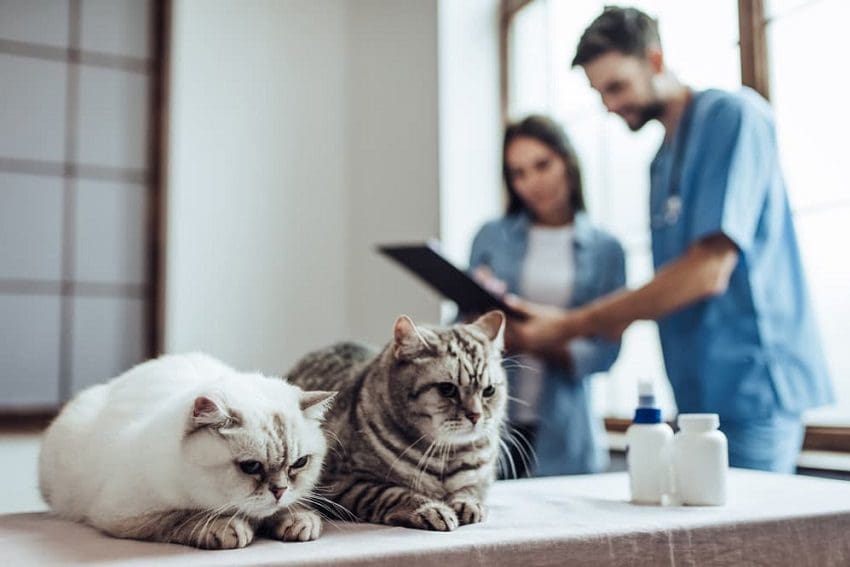
Ensuring a cat’s health and happiness is the most important responsibility of any pet owner.
And medical care for cats plays a crucial role in this endeavor. That’s why it’s so important to take your cat to the veterinarian.
- Early detection of health problems: Cats are good at hiding signs of illness. Regular checkups allow doctors to identify potential health problems. It will make further treatment more effective and less expensive.
- Vaccinations: Vaccinations protect your cat from contagious and potentially fatal diseases. Your vet can recommend a vaccination schedule tailored to your cat’s needs.
- Parasite control: Cats are susceptible to parasites like fleas, ticks, and worms. Routine vet visits help prevent infestations and ensure your cat remains parasite-free.
- Dental care: Dental health is vital for cats. Regular check-ups can catch dental issues early and prevent painful dental diseases.
- Longevity: Cats are living longer, healthier lives thanks to advances in veterinary care. Regular visits to the vet contribute to your cat’s overall longevity and well-being.
Remember, a healthy cat is a happy cat. And regular visits to the vet are the cornerstone of a long and fulfilling life.
Don’t wait for signs of illness or to call the vet for the cat. Prioritize prevention.
Kitten Vet Visits
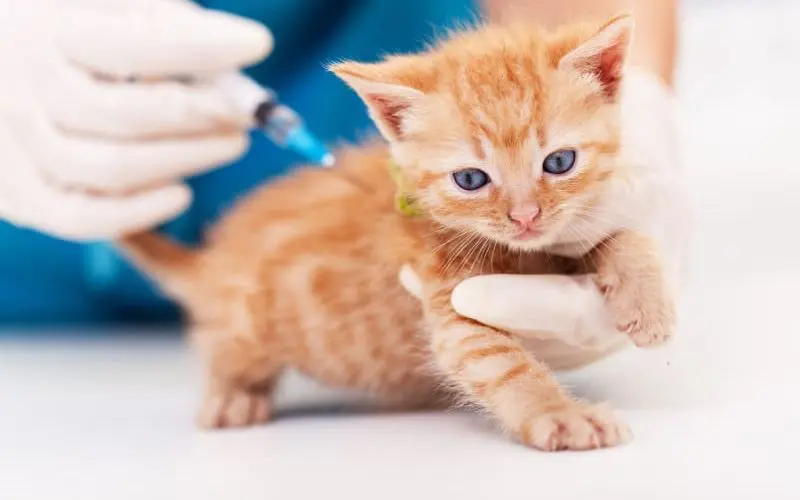
Of course, many people wonder how often do you take a cat to the vet. But with kittens, this question arises much more often.
After all, it is in childhood that every living creature lays down immunity for the future.
Below, we have translated the recommendations on the timing of vet visits for kittens:
- First visit (6–8 weeks old): The initial vet visit is typically recommended when kittens are around 6–8 weeks old. During this visit, the vet will perform a comprehensive exam. The vet will give vaccinations and basic kitten care.
- Second Visit (10–12 Weeks Old): A follow-up visit is usually scheduled at 10–12 weeks of age. At this time, the kitten is given additional vaccinations. The vet will also evaluate the kitten’s growth and general health.
- Third Visit (14–16 Weeks Old): Around 14–16 weeks of age, kittens receive their final round of vaccinations. These vaccinations are crucial for building immunity against common feline diseases. Your vet may also discuss spaying or neutering options at this stage.
- Regular check-ups (annually): After the first series of vaccinations, continuing vet check-ups for cats is important. It is for vaccinations and preventive care throughout the cat’s life.
Remember that these are general recommendations. Only your veterinarian can adjust the schedule to suit your kitty.
Regular vet visits are the key to ensuring that your kitten grows into a healthy and happy adult animal.
Adult Cat Vet Visits
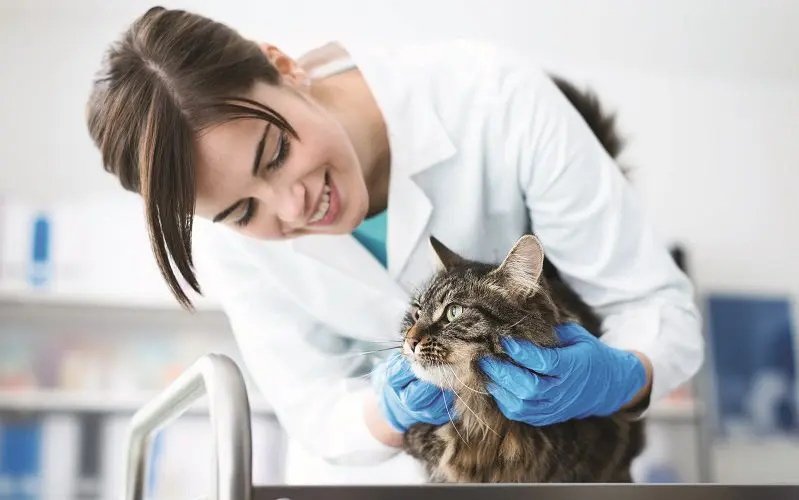
Visits to the veterinarian for adult cats are very important to keep them healthy and detect potential problems early.
Here are recommendations for the timing of adult cat check-ups:
- Annual Check-up: Most adult cats should have a comprehensive veterinary examination once a year. During this visit, the veterinarian will perform a thorough examination. If necessary, he will update vaccinations and discuss any problems or changes in the cat’s behavior and health.
- Dental Care: Dental health is vital for adult cats; dental issues can arise over time. Your vet may recommend a dental check-up and cleaning once a year or as needed based on your cat’s dental health.
- Special Considerations: Depending on your cat’s age and health status, your vet may suggest more frequent visits or specific tests. Your vet will often recommend a semi-annual checkup for older cats (usually over seven years of age) due to the increased risk of age-related health problems.
- Sick or injured cats: If your cat becomes sick or injured, don’t hesitate to schedule a vet visit promptly. Early diagnosis and treatment can significantly improve outcomes.
Remember that every cat is unique. Your vet can schedule when to call the vet for the cat.
It all depends on your cat’s individual needs. Regular visits to the vet are the key to an adult cat’s health and well-being.
Senior Cat Vet Visits
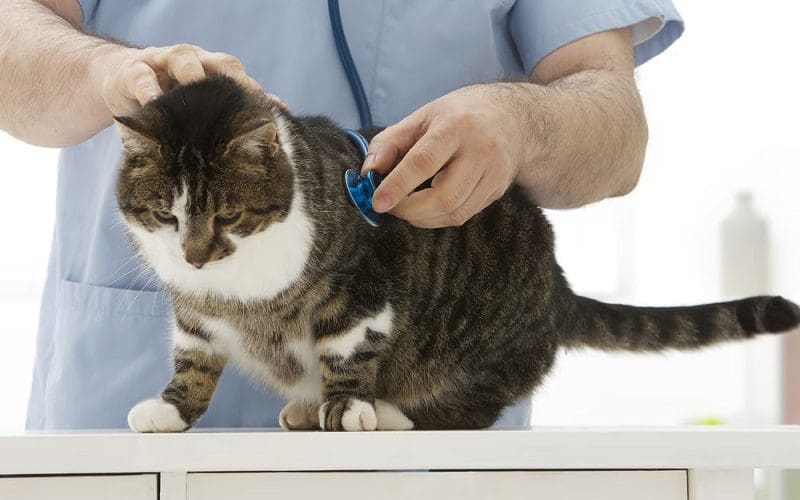
If you own an older cat, you need to provide more frequent medical care for it.
This way, you can address underlying health problems and ensure good health.
Here are our recommendations for when to visit the vet:
- Semi-Annual Check-ups: Senior cats benefit from more frequent veterinary visits. Consider scheduling checkups every six months. These visits allow for the early detection of age-related diseases.
- Dental Health: Dental problems are common in older cats. Regular checkups and cleanings will help maintain oral health.
- Bloodwork and urine analysis: The doctor may recommend regular testing. This way, they can monitor organ function and detect any abnormalities.
- Weight and nutrition: Senior cats often experience changes in weight and dietary needs. Your vet can advise on weight management and recommend suitable diets.
- Mobility and pain management: Arthritis and joint issues become more common as cats age. Your vet can assess your cat’s mobility and recommend treatment if necessary.
- Eyes and Vision: A vet for a cat can identify eye problems. It could be cataracts or glaucoma.
Remember that older cats require extra attention and care.
Regular visits to the veterinarian are very important for the early detection and treatment of age-related problems.
It will ensure your elderly cat has a comfortable and healthy old age.
7 Reasons to Take Your Cat to the Vet
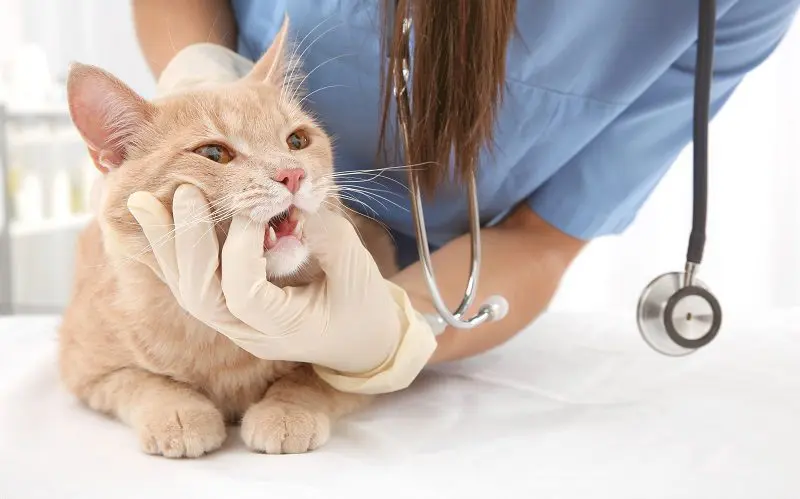
When asked how often you take a cat to the vet, veterinarians answer at least once a year. And you need to do this for several reasons:
- Regular checkups: Regular visits to the veterinarian help keep an eye on your cat’s overall health. The vet will be able to detect problems early and administer the necessary vaccinations.
- Disease Prevention: Vaccination protects the cat from contagious and potentially fatal diseases.
- Parasite control: Veterinarians can help prevent and treat parasites. Parasites can be detrimental to your cat’s health.
- Dental health: Dental problems can lead to pain and other health issues.
- Behavioral problems: Veterinarians can address behavioral problems that may be related to underlying health issues.
- Elderly animal care: Older cats require special attention. Medical care for cats can help manage age-related conditions.
- Emergency care: In cases of accidents or sudden illnesses, having a veterinarian you trust is crucial for immediate and appropriate treatment.
Regular visits to the veterinarian are an essential part of responsible cat ownership.
You will ensure a long and healthy life for your feline companion.
9 Tips for Bringing Your Cat to the Vet
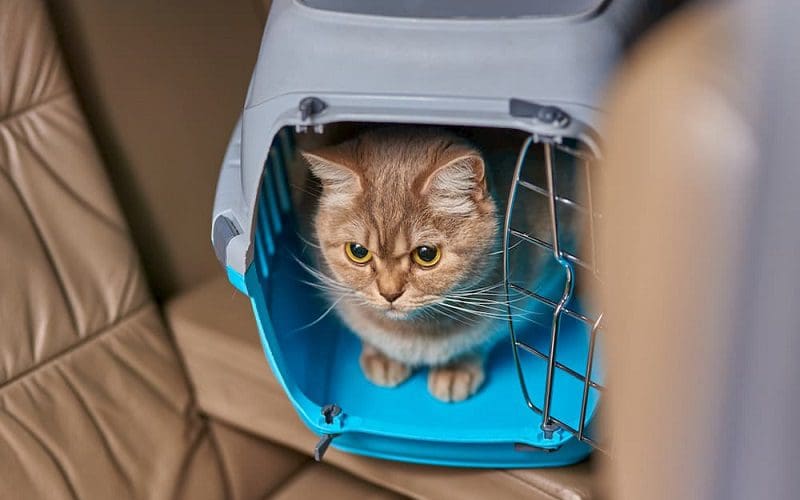
Bringing your cat to the vet can be a daunting task. But with preparation and patience, you can make this less of a vet visit for cats.
Here are some tips:
- Practice Handling: Get your cat used to being handled and touched, especially in sensitive areas like paws and ears. It can help reduce anxiety during the vet visit.
- Use a carrier: Invest in a secure and well-ventilated cat carrier. Leave it open at home so your cat can explore it and associate it with safety.
- Positive Associations: Place treats, toys, or familiar bedding inside the carrier to make it a more inviting space.
- Plan: Schedule vet appointments during quieter times to reduce waiting room stress. Ask the vet clinic for advice on when to come in.
- Keep Calm: Remain calm and composed, as cats can sense your anxiety. Speak to your cat in soothing tones.
- Cover the carrier: Cover the carrier with a light blanket or towel during the car ride to minimize visual stimuli.
- Bring familiar items: Bring your cat’s favorite toy or blanket to comfort them during the visit.
- Reward Afterward: Reward your cat with treats or playtime after the vet visit to create a positive association.
- Consider pheromone sprays: Feliway, a feline facial pheromone spray, can help reduce stress during the visit.
Follow our tips and advice on when to call the vet for the cat. Make vet visits less stressful for your cat by ensuring their health and well-being.
Why Does a Cat Need to Visit The Vet as Often as a Dog?
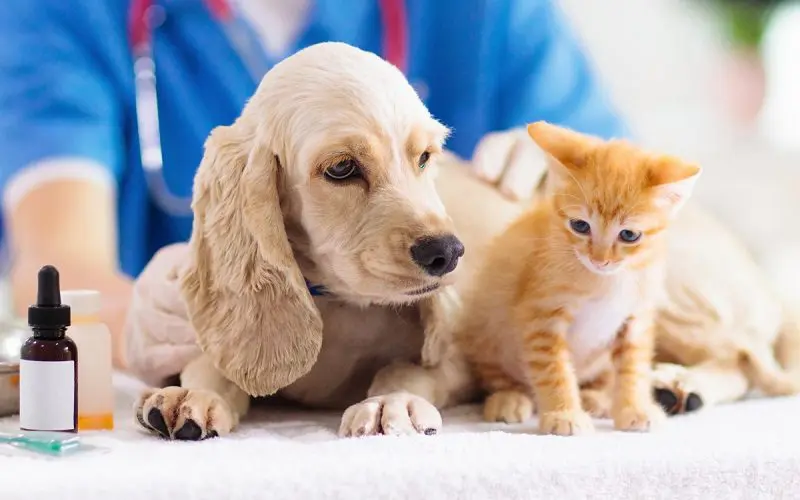
Many cats don’t require as much attention, nor do they need to be let outside to relieve themselves. So the natural conclusion is that they are also lower-maintenance when it comes to vet visits, right?
Not so fast. Those vet visits are just as important for a cat as they are for a dog. Let’s explore why!
1. Independence
Your feline’s independent nature is exactly the reason she does need to visit the veterinarian regularly, at least once a year.
Well visits for cats allow the vet to give her an overall check-up to provide early detection of health issues.
Cats are notorious for masking pain, and even though you know your pet well, a vet may detect an issue that you overlooked.
2. Cat Fights
If you have an intact male cat (meaning he’s not been neutered), chances are good he’ll slip out and get himself into some fights with other cats in the neighborhood.
He’s a master of defending his territory, and if he comes home with any injuries, he needs to be seen by a vet to ensure he doesn’t get an infection.
3. Everything’s a Toy
We have a friend whose cat ingested a nipple from a baby bottle, and the only way to remove it was a very costly surgery.
Cats seem to enjoy playing with items that are truly dangerous for them—strings and rubber bands, for example—and because they are so agile, they can access items you think are out of their reach.
Many of these would-be toys can only be removed surgically, or you risk damage to internal organs. If you are concerned that your cat has ingested a foreign object, it’s important to get her to the vet right away.
4. Tooth Decay
Tooth decay, or feline odontoclastic tooth destruction, is very common in cats over 5 years old, and it can cause serious issues.
If your cat is having difficulty eating, is drooling excessively, or is bleeding from the mouth, visit the vet right away.
5. Behavior Changes
If your once-loving cat starts avoiding you or your never-misses-the-litter cat suddenly starts spraying or marking, it’s time to head to the vet.
Often, behavior changes are one of the first indicators of a health issue, and seeing the vet right away may allow you to get ahead of a larger problem.
Cats and dogs both have wonderful attributes that make them great pets, but one thing they share is the need to see the veterinarian regularly.
It’s a small thing to do to repay your furry friend for the job she brings to your life!
Conclusion
A vital aspect is going to the veterinarian. It demonstrates your bond with your cat.
Remember to have your cat checked at least once a year. It will assist you in providing a healthy and happy life for your cats.
Be careful to follow your doctor’s suggestions. Remember that our cat’s long life is solely due to your efforts.
So, how often do you take a cat to vet? Leave a comment about your experience in our comment section.
Resources:

Dr. Linda Simon MVB MRCVS is a locum veterinary surgeon who has worked in London for the past 8 years. She graduated top of her class in small animal medicine from UCD, Dublin. She is currently a member of the Royal College of Veterinary Surgeons. Linda is the resident vet for Woman magazine and a frequent contributor to People’s Friend Magazine, the Dogzone website, Vet Help Direct and Wag! Linda also writes content for the CVS veterinary group, Vetwriter and a number of other establishments.
